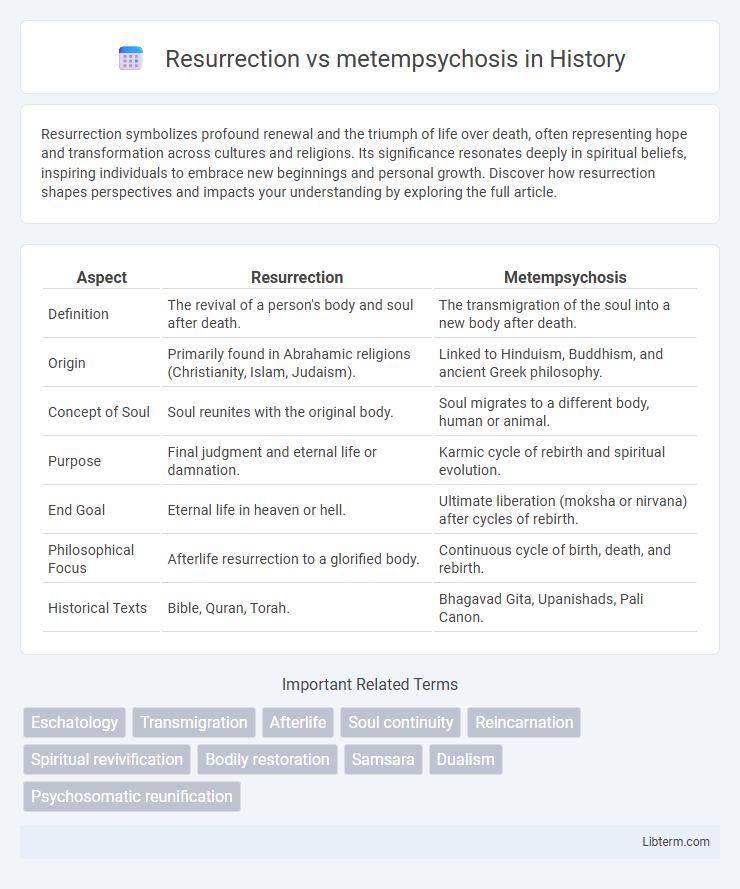Resurrection symbolizes profound renewal and the triumph of life over death, often representing hope and transformation across cultures and religions. Its significance resonates deeply in spiritual beliefs, inspiring individuals to embrace new beginnings and personal growth. Discover how resurrection shapes perspectives and impacts your understanding by exploring the full article.
Table of Comparison
| Aspect | Resurrection | Metempsychosis |
|---|---|---|
| Definition | The revival of a person's body and soul after death. | The transmigration of the soul into a new body after death. |
| Origin | Primarily found in Abrahamic religions (Christianity, Islam, Judaism). | Linked to Hinduism, Buddhism, and ancient Greek philosophy. |
| Concept of Soul | Soul reunites with the original body. | Soul migrates to a different body, human or animal. |
| Purpose | Final judgment and eternal life or damnation. | Karmic cycle of rebirth and spiritual evolution. |
| End Goal | Eternal life in heaven or hell. | Ultimate liberation (moksha or nirvana) after cycles of rebirth. |
| Philosophical Focus | Afterlife resurrection to a glorified body. | Continuous cycle of birth, death, and rebirth. |
| Historical Texts | Bible, Quran, Torah. | Bhagavad Gita, Upanishads, Pali Canon. |
Defining Resurrection: Core Beliefs and Origins
Resurrection is a fundamental concept in Abrahamic religions, particularly Christianity, Judaism, and Islam, defined as the bodily rising from the dead after a single earthly life, symbolizing ultimate divine judgment and eternal life. This belief originates from ancient scriptures such as the Hebrew Bible, New Testament, and Quran, emphasizing a physical restoration of the original body. Resurrection contrasts metempsychosis, the transmigration of the soul into another body or life form, prevalent in Hinduism and Buddhism, highlighting distinct theological views on life, death, and the afterlife.
Understanding Metempsychosis: Historical Context and Meaning
Metempsychosis, rooted in ancient Greek philosophy and Hindu beliefs, describes the soul's transmigration into a new body after death, emphasizing continuity of consciousness across lifetimes. This concept contrasts with resurrection, which entails the reanimation of the original body by a divine power at a specific future time, often associated with Abrahamic religions. Understanding metempsychosis involves examining its role in shaping moral behavior through cycles of rebirth and its influence on spiritual traditions like Pythagoreanism and Jainism.
Key Philosophical Differences Between Resurrection and Metempsychosis
Resurrection centers on the belief in bodily revival after death, emphasizing a definitive, singular reawakening of the same individual, often tied to divine judgment. Metempsychosis, or transmigration of souls, involves the soul's continuous cycle through multiple lives in different bodies, reflecting a metaphysical belief in reincarnation and karmic progression. Resurrection underscores finality and identity preservation, while metempsychosis emphasizes spiritual evolution and the perpetual transformation of consciousness.
Resurrection in Major World Religions
Resurrection, a central doctrine in Christianity, Judaism, and Islam, asserts the revival of the same individual body after death, emphasizing continuity and divine judgment. Christianity highlights resurrection on the Day of Judgment as a pathway to eternal life, while Judaism anticipates a future bodily resurrection linked to messianic redemption. In Islam, resurrection (Qiyamah) involves the physical reawakening of all humans for divine accountability, reinforcing moral responsibility and the afterlife's realities.
Metempsychosis in Eastern Spiritual Traditions
Metempsychosis, central to Eastern spiritual traditions such as Hinduism, Buddhism, and Jainism, describes the soul's cyclical rebirth across different life forms guided by karma's moral law. This process contrasts with resurrection, which implies a one-time revival of the same body and soul after death, typical in Abrahamic faiths. Metempsychosis emphasizes spiritual evolution and liberation (moksha or nirvana) through successive incarnations, highlighting the interdependence of life, death, and rebirth.
Afterlife Expectations: Personal Identity and Continuity
Resurrection emphasizes the restoration of personal identity through the reanimation of the same physical body, ensuring continuity in the afterlife as a direct extension of the earthly self. Metempsychosis, or reincarnation, involves the transmigration of the soul into a different body, leading to a transformation that challenges the persistence of individual identity across lifetimes. Afterlife expectations in resurrection focus on a consistent, recognizable self, whereas metempsychosis anticipates spiritual evolution through multiple, distinct embodiments.
Scriptural References: Resurrection vs Metempsychosis
Resurrection is prominently depicted in Scriptures such as John 11:25, where Jesus declares, "I am the resurrection and the life," affirming bodily revival after death. In contrast, metempsychosis, or the transmigration of souls, lacks direct biblical support and is associated more with Eastern philosophies and speculative traditions. Scriptural texts like Hebrews 9:27 emphasize a one-time judgment after death, reinforcing resurrection over reincarnation concepts.
Ethical Implications of Resurrection and Metempsychosis
The ethical implications of resurrection emphasize personal accountability and moral justice, where individuals face consequences for their actions in a definitive afterlife. In contrast, metempsychosis, or the transmigration of souls, suggests a cyclical process where moral development occurs over multiple lifetimes, promoting continuous ethical growth and karmic balance. Resurrection underscores final judgment, while metempsychosis encourages long-term spiritual evolution through reincarnation.
Modern Interpretations and Debates
Modern interpretations of Resurrection often emphasize its symbolic significance in Christian theology, representing spiritual renewal and eternal life, while scholarly debates explore its metaphorical versus literal understanding. Metempsychosis, or reincarnation, is examined within contemporary philosophical and psychological frameworks, highlighting themes of soul transmigration and personal identity continuity across lifetimes. Current discussions analyze the compatibility of these beliefs with scientific perspectives on consciousness and the afterlife.
Comparative Impact on Culture and Spirituality
Resurrection, central to Christianity and Islam, emphasizes bodily revival and eternal life, profoundly shaping Western and Middle Eastern cultural rituals, moral frameworks, and eschatological beliefs. In contrast, metempsychosis, rooted in Hinduism, Buddhism, and ancient Greek philosophy, promotes the cyclical transmigration of the soul, influencing Eastern spiritual practices, concepts of karma, and ethical behaviors. Both doctrines impact cultural identity and spirituality uniquely, with resurrection fostering linear time perspectives and final judgment, while metempsychosis encourages continuous spiritual evolution and reincarnation.
Resurrection Infographic

 libterm.com
libterm.com